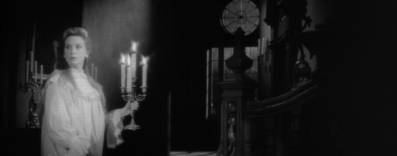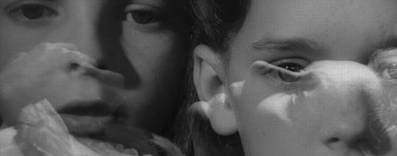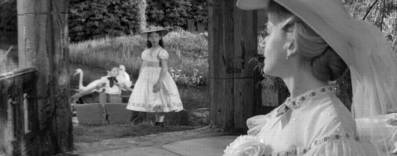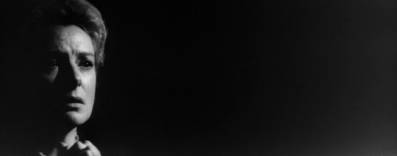"It
was only the wind, my dear..." |
The
boy Miles (Martin Stephens) calming
the overwrought governess (Deborah Kerr). |
And
what if it really was 'only the wind...'?
The
implications of believing that take us down some very dark
and corrupting places in interpreting the gloriously creepy
and densely layered The Innocents. What
if Deborah Kerr's prim, starched, goody-goody Miss Giddens
is one of the most monstrous creatures unleashed in cinema
but no one told her? She makes the all too human error of
believing herself to be absolutely right at the expense
of those in her care. You could see this is a fundamental
problem wired into overtly religious people. Producer/director
Jack Clayton has delivered a film with one aspect that no
one in Hollywood would sanction today. It drips with cloying
but delicious ambiguity. And it's that trait that elevates
Henry James' original novella (and the stage play source
material) into a bona fide classic movie and this BFI presentation
has done it proud. For the sake of debate, I'm going to
regard The Innocents as a movie about mental
illness, about the influence of God, about the harm misguided
morals can wreak and let's not forget simple childlike wickedness.
Yes, there are ghosts – and hugely effective ghosts – but
are they, in the context of the film, 'real'? Oh, you'll
have some fun with this one if it doesn't scare the bejesus
out of you first. The beauty of Clayton's smart take on
The Turn of the Screw is the fact you can
take it any way you like...

How
do you instantly know if a psychological horror film is
going to be as good as its 45-year-old reputation? It's
when the actual DVD menu scares you, that's how. I have
loved this film ever since it seeped into me like black
poison many years ago as every good twisted horror film
should. If I need any more testaments to its stark power
then today's viewing did nicely. It was light when I started
and pitch dark when I finished – and being (as I am) as
old as the film (both of us were distributed in 1961) you'd
think I'd have a bit more reason and common sense to draw
upon but no. Miss Giddens is asked at the start of the film
"Do you have an imagination?" Mine runs rampant
after brilliantly executed chillers. I experienced actual
fear climbing from my dark cellar to the security of a lit
home above. And it strikes me as even more ludicrous that
it was the face of who was to become Jason King that was
unnerving me. The only thing scary about Jason King was
the audacity of his facial hair. But not in Jack Clayton's The Innocents. Oh no. He made Peter Wyngarde
a demon. Here was a movie that dared to be utterly ambivalent
and it's another nod to its power that thirty years ago,
I believed its ghosts were real and that the governess was
trying to save the children. Today I'd bet that the apparitions
are not only all in the governess's head but that her character
has gone some way down the road of the blackest of evil
– those that staunchly believe they are doing God's will.
Cinema.
Is there nothing it cannot do?
It's
the mid 1800s. Deborah Kerr (on superlative form as the
repressed governess) is employed to be the sole guardian
of a niece and nephew of a social hedonist, a man who wants
nothing to do with the children in his official care. She
is somewhat taken by him, enough that she commits to what
appears to be a dream job; swan about in enormous dresses
at a country mansion, teach a boy and girl the rudiments
of reading and writing and leave the cleaning and cooking
to the other staff – perfect. Except that you harbour a
strengthening belief that the children are actually possessed
by the malevolent spirits of a violent, sexually aggressive
footman and his former governess lover, long since deceased...
OK. So far, so Freudianly freaky.

The
movie has the most startling opening. A children's voice
sings a mournful lament as the 20th Century Fox logo gives
up its authorial fanfare. We mix to a black screen and crawling
into frame, we see hands in prayer finally revealing Deborah
Kerr mourning over what must have been a terrible event.
She seems either possessed, receiving some spiritual presence
or in the throes of buttoned down sexual ecstasy. It is
an amazing performance and the way the scene is lit gives
this primly beautiful woman, black eyes – not violence induced
shiners but actual black eyes, like a shark's. This simple
opening reveals what must be a devastating ending waiting
for us. It's an ending that even film-makers today would
shy away from. You just can't see Miles' and Flora's haunting
faces on a Happy Meal box – thank Christ.
Freddie
Francis' rich, oil-black, snow-white cinematography has
been justly lauded. If the film were sharper, the clapper-loader
would be fingerless. The camera movements, subtle and eerily
invisible, are nevertheless notable. This was a double blimped
Mitchell 35mm camera we are talking about here. Think of
an anvil with a lens on it. To get this richness and sharpness
correctly exposed, and depth of field successfully elongated,
Francis used scores of brutes, huge lamps that would have
made acting more than a little uncomfortable. Apparently
Kerr turned up one day with sunglasses on. But it was worth
it. The film sparkles in every sense except negative dust
(motes of which produce sparkles of white where the negative
was not exposed – technical snippet ends here).
Metaphor
is one of cinema's richest seams. To support a thesis of
Miss Giddens being a malign and deadly influence on the
children, I draw your attention to one of the first things
she does upon arriving at the house. She is naturally drawn
to a vase of beautiful flowers. As soon as she touches them,
their petals fall. It's a distinct throw away but as a portent
(the children's lives can only get worse once Miss Giddens
gets her hands on them) it's as neat an idea as it should
be. Her real undoing is making judgements and assuming their
veracity and then balancing another stillborn judgement
on top. Soon she has a tower of unreason that would make
Richard Dawkins bark. Miss Giddens was raised in a small
house and her father was a vicar. She reads the Bible when
the children are asleep and is prone to shocking and vivid
hallucinations. And these hallucinations are as chilling
as anything a computer generated image can throw at us.

The
previous governess and her sexually aggressive footman appear
to Miss Giddens at various points in the narrative. We see
through the governess' eyes because we see her reaction
to an apparition before we see what she's seeing. Inexplicably,
one of the most effective is the decidedly non showy 'ghost
governess' who swishes noiselessly by in an upstairs corridor.
Why is such a fleeting image of a young lady so masterfully
creepy? I would guess it's all down to mood setting and
by that time in the narrative, a shot of a packet of crisps
would have sent me crawling up the curtains – if I had any
curtains. There is only a single tear or droplet of water
as any sort of physical evidence of the ghosts (a mistake
that screenwriter Truman Capote made and latterly felt 'let
the show down'). It's enough to plough Miss Giddens' mindset
into a terrible trough of inevitability.
The
sound effects are also noteworthy. The natural sounds of
the house's garden are amplified so that bird song becomes
unsettling, harsh and strident. The odd sounds the house
itself makes as Miss Giddens floats through black corridors
with only candles to guide her are genuinely chilling. Floorboards
creak, doors squeal shut and the voices... If there was
anything approaching a criticism it would be the over-use
of a very familiar echo effect. Of course, 45 years ago
that was probably cinema's audio equivalent of full CG motion
capture. It's really the only aspect that dates the movie,
a film-maker overusing a new toy. (Note: Frayling covers
this point on the commentary almost exactly as I originally
wrote the previous sentence, blast those overlapping Extras!)
So
Miss Giddens has now decided what the trouble is, never
once questioning her method of arriving at such a terribly
misguided conclusion. Her plan is to expose the children
to her own terrible neurosis (or the ghosts) in order to
cure them. Yes, let's paint the children a little darker
– they are both kids who seem distracted (in shock more
like at being present while death presented itself years
earlier). The boy Miles is sent home, expelled from school
for being a malign influence on his classmates but we never
really find out why. He is overly polite and in one stunning
scene shot in glorious close up, he kisses Miss Giddens
goodnight – but it's on the lips and Deborah Kerr is exemplary
here. Here is seriously brilliant and outstanding acting
– just watch that face. She is confused, aroused even and
in her eyes there is a terror of what she must recognise
is inside her. But she doesn't. It's all loaded on to the
children and the corrupting spirits of the footman and his
lover inside them. The kiss happens again but it would be
unfair for me to reveal the circumstances but it's a real
shock...

The
Innocents is a cracking supernatural chiller with
a shocking ending that leaves you genuinely unnerved. It
is also one of the greatest ghost stories ever shot.
Presented
in anamorphic 2.35:1, the print from which this DVD was
struck is in pristine condition. I would need several viewings
and a large magnifying glass to find even a single scratch.
The stunning black and white palette of Freddie Francis
is shown off as well as the DVD format can. Of course, it
belongs on a massive screen but all power to whomever found
this stunning print. The 1961 mono soundtrack, rendered
in Dolby 2.0, shows its age only stylistically. There is
only noticeable hiss if you crank the sound up – not necessary
to thoroughly enjoy the movie.
What
can I say? Two words that set this DVD up as a real classic;
'Christopher' and 'Frayling'. His informed coverage and
encyclopaedic knowledge of not only the film but the context
in which the film was made is bursting with fascination.
You never get the sense he's showing off or just exercising
a great intellect. He's communicating and he's doing it
superbly. Trivia buffs note I am writing this on Frayling's
61st birthday, Christmas Day, 2006. Happy Birthday, Christopher.
Oh,
frustration! I chose the quote for the start of the review
and now listening to Frayling's commentary, he takes the
line out for praise... Another example of the Extras gazumping
the reviewer after the event...
Commentary
with Professor Christopher Frayling
See above, a superb commentary and one other commentators
would be wise to study. It's revealing, highly knowledgeable
and extremely listenable. I would have been happy with simply
taking away the fact that Clayton turned down Cary Grant
as the uncle but the commentary is full of such gems. He
unveils the extraordinary multivalency of the movie (great
word Mr. Frayling introduced me to, meaning susceptible
to many different interpretations) and you come to the conclusion
that the thought, artistry and intellectual vigor poured
into this film is considerably more than you got after several
viewings. I've now seen it about six or seven times and
Frayling introduced me to ideas that were wonderfully illuminating
and original.
Introduction
by Christopher Frayling
Terrific location-based introduction to The
Innocents and featuring Professor Frayling at the
original locations, a theme not lost here at Outsider (see
Withnail
Extras and Went
The Day Well? review).
Original
trailer
This is rather less ambiguous – she's the
only one who can save the children! Oh no she isn't! "Do
they ever return to possess the living? Mwah ha ha!"
It's a US Trailer so seems to be a little over the top.
Actually it's a great deal over the top.
The
Bespoke Overcoat (1955, 33 mins)
Jack Clayton's first film as director – an Oscar and BAFTA
award-winning short starring Alfie Bass and David Kossoff
and it's quite bizarre! In short, a man returns from the
grave to steal an overcoat from his ex-employer with help
from his tailor. It feels like a Samuel Beckett discourse
and is acted very well but the style is so odd. Worth a
look, no question – but very odd.
Image
Gallery
Stills gallery including original costume
designs, publicity posters, press books and production pictures.
This is of interest to true fans of The Innocents, including
stills from the originally shot opening (Miles' funeral
which would have literally turned the movie around and forced
it into a straight line, not good).
Booklet
including film notes by Jeremy Dyson (the
less visible of the writers of The League of Gentlemen)
This is one of the very few 'booklets' that can be celebrated
as a true extra. The DVD is beautifully presented in a well
designed cover and hard card jacket (both oddly missing
the words 'A Film By' which gives the odd impression that
Jack Clayton is the lead actor in the film). The actual
booklet has several positive points.
- "Fog
and rain and long winter nights..." Jeremy Dyson's
3 page essay on the movie;
- 3 storyboards by John Piper;
- 5
page article by Penelope Houston written for Sight
and Sound in 1961';
- Cast
and Credits including proper biographies of the major
players and a page of the original screenplay which
is fascinating (with all the continuity notes scribbled
all over it);
- A
page on the short, The Bespoke Overcoat.
Buy
it. No, really. Buy it. If you know the film, you won't
find a better quality DVD of it and if you don't know
the film and enjoy classy horror, then get this disc,
open a bottle, wait for nightfall and get ready to have
your blood chilled... But then, it's was only the wind,
my dear...
|